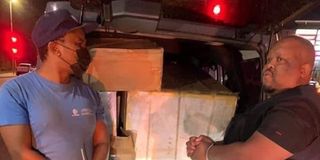South Africa protests: CEO arrested, suspended over looting

Qhawe Sithole (right), CEO and director of Ubuntu Wealth Management, is pictured following his arrest for allegedly taking part in looting in Durban, South Africa.
What you need to know:
- Mr Qhawe Sithole, CEO and director of Ubuntu Wealth Management, was arrested for allegedly stealing alcohol, a bar stool, a washing machine and braai accessories in Umhlanga, Durban.
The chief executive officer of a wealth, investment and asset management company in South Africa has been suspended for allegedly taking part in the looting and violence that have rocked the country over the last few days.
Mr Qhawe Sithole, CEO and director of Ubuntu Wealth Management, was arrested earlier for allegedly stealing alcohol, a bar stool, a washing machine and braai accessories in Umhlanga, Durban.
Viral images on social media saw Mr Sithole handcuffed with the said items by his side. Some are seen packed in a Jeep Wrangler, an expensive car by South Africa’s standards.
In a statement following Mr Sithole’s suspension after the arrest, Ubuntu’s Chief Operating Officer Mmangaliso Nxumalo said: “The board wishes to clarify that the chief executive officer has been suspended with immediate effect pending the outcome of his case and an independent investigation into the charges that have been brought [against] him.”
“Once the board receives all facts [in] this case and studies the findings, [it] will take the recommended disciplinary action against the chief executive as required. The board will move swiftly to institute such disciplinary action so that the matter [is] resolved as soon as possible.”
The COO added: “This remains a matter of utmost concern to the board. The board wishes to assure all stakeholders and the public that this matter is receiving all the attention it deserves. However, the board is also at pains to ensure that due process is followed at all times.”

Armed community members gather around a fire to keep warm at a road block set up in Phoenix Township, North Durban, on July 15, 2021 to prevent looters from reaching the community.
CEO's account
According to Ubuntu’s website, Mr Sithole is a former leader at Holton College, an elite private boarding school for boys and one of the most expensive schools in South Africa.
He is also an alma mater of the University of Cape Town where he obtained a bachelor of commerce degree in economics.
Mr Sithole argues that he was not participating in the violent looting.
“I moved into a new place at the beginning of July. I was buying my furniture … they just flipped this whole thing on me [sic],” he told News24.
“I was moving furniture [on Tuesday] to my place … I've got all my receipts. The [police officer] said if I bring the receipts, they will give all my stuff back.”
Calm returning
The unrest which rocked Gauteng and KwaZulu-Natal (KZN) saw shops ransacked and items such as beds, fridges, television sets and groceries stolen.
That some people were captured live on television and all over social media loading their loot into their cars has triggered a debate over whether the unrest was driven by poverty.
Meanwhile, Gauteng and KwaZulu-Natal (KZN) provinces started returning to normalcy on Friday, after a week of violent protests, but there are fears of shortages of food and fuel.
South Africa has also started counting the cost of arson and the looting frenzy with initial projections pointing to devastating amounts of money.
Empty shelves are being witnessed in some supermarkets in Gauteng and KZN as deliveries and the production of goods were disrupted.
Queues for bread are also being seen as the two most populous provinces are starting to feel the pinch of the chaos amid a push for former President Jacob Zuma to be freed from jail.
Chaos erupted following Zuma’s 15-month sentence for contempt of court. What started as protests against his incarceration turned into “opportunistic criminality”, according to the South African Police Service.
The violent riots began in KZN last Friday before spreading into Gauteng at the weekend. The looting mainly took place in townships in what is regarded as the worst unrest since the end of apartheid 27 years ago.
Economic impact
There are also fears of looming fuel shortages as the Shell and BP South African Petroleum Refineries (Sapref) in Durban, the country’s largest crude oil refineries, temporarily shut down on Tuesday due to the chaos.
Some fuel stations turned away motorists for lack of the commodity.
Cane fields were burnt in KZN, the largest sugar-producing province in South Africa, forcing some sugar mills to shut, but acting Minister in the Presidency, Khumbudzo Ntshavheni, has tried to allay the fears.
“I need to clarify this allegation that food supplies will run short in 24 hours – it’s not correct. We have been in meetings with industry players. Food supplies are not going to run short in 24 hours. There are enough supplies to last us until the N2 and N3 are opened to move the goods.”

This aerial view shows people queueing to buy food and other supplies at the Windermere Shopping Centre in Durban, on July 16, 2021.
The looting and destruction of key economic infrastructure especially at the Port of Durban, which handles 65 percent of South Africa’s container traffic, has placed the country on the economic edge.
PricewaterhouseCoopers (PwC) projects 50,000 jobs are now at risk under the baseline scenario.
“From our perspective, these events essentially placed key areas of the Gauteng and KwaZulu-Natal economies in a virtual level five lockdown,” PwC said in its July economic outlook report.
“Our calculations show that national GDP growth could be 0.4 percentage points lower this year due to this week of significant disruption.”
The retail industry was the worst hit by the violent protests, with an estimated R5 billion was lost.
A surge of Covid-19 infections is also expected as rioters were seen without masks in a country experiencing vaccine hesitancy.





